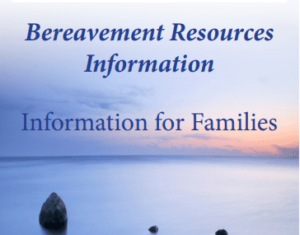Bereavement Care
What is normal grief?
Grief is a natural reaction to any loss, not just death. Often described as a journey, grief does not follow set stages. It can include many mixed and different thoughts and feelings. Most people “go in and out” of their grief as they adjust to life again. The normal process of adjustment may include learning new skills, or taking on new tasks such as managing
finances or cooking.
How will grief affect me?
Grief involves a range of emotional, physical and spiritual responses, which you may not be used to dealing with. Like a wave, one moment you feel fine and can cope, and the next moment grief washes over you, overwhelming you.
When someone close dies you may struggle to make sense of the experience. It is often difficult to put into words how painful the feelings of grief are and you may wonder if it will ever get any better. In time, you will learn to live with the loss and enjoy life again, but how long this takes is different for everyone.
Grief is a very complex process and affects everyone differently. Everyone had a different relationship with the person who died. You might have been very close to the person, or maybe there were challenges or difficulties in your relationship with the person who died. This will affect how you grieve and you might be surprised at the intensity of your feelings now.
Each grief reaction is unique and it is impossible to know how you are going to be during the bereavement. Nobody can tell you how you are going to feel. You may experience sleep disturbance, changes in your appetite, poor memory and concentration, increased levels of anxiety, stomach upsets and headaches. If physical symptoms persist over a prolonged period then it can be helpful to talk to your family doctor and get these checked out.
How will grief affect the family?
When somebody in the family dies it affects the whole family. However, each person is grieving a different relationship with the person who died. One person may be grieving the loss of a spouse, while for others it is a parent or a brother or a sister or a child.
The family as a whole has to adapt to life without the person physically present. The different roles people have in the family must change to take account of this. This adjustment is happening at the same time as family members are grieving and it can be a very emotional and tense time for everybody. This is normal and happens to all grieving families. Families differ in how much they talk about sad and painful issues. Some families find it very difficult to share their emotional journey with one another as they travel through grief. It will be helpful if you can talk to other family members about your experience of grief, although it is important to remember that everyone in your family may be grieving differently.
How will grief affect the children and teenagers?
Children and teenagers grieve too when somebody dies. They need honest explanations of how the person died and what will happen now. The amount of information they need will vary depending on their age and ability to understand what is happening. Children often need to ask repeated questions and get information gradually from an adult they trust.
Very young children may not fully understand the concept of death but they certainly react when somebody dies. This reaction will often be shown in their behaviour. Grieving children may go back to behaving in a way typical of when they were younger. Others may try to take on more responsibility in the family than they should and this is something to be careful about.
Children benefit from a chance to show their feelings and to have them acknowledged. They often need help to understand their feelings. Teenagers may withdraw from family and friends as they try to make sense of what has happened. Children & teenagers also need to play and have fun – taking a break from the hard feelings of grief. However, it is important to remember that children and teenagers have the right to comfort other family members who are grieving and this may help them contribute to the changes going on within the family.
How to make an appointment:
Please contact the Social Work Department at 01 832 7535 or bereavement@sfh.ie. A Social Worker will speak to you about our services and your own support needs before an appointment is set up. We sometimes have a short waiting list for an appointment.
Our social work team developed this book to help teenagers and young adults navigate their way through grief and loss.
With support from AWS in Communities, this book is available free of charge to anyone who might find it helpful.
It is also available as an ebook: Finding Your Way Through Grief
Our social work team developed this book to help children aged about 9-12, with the support of their parent or guardian, navigate their way through grief and loss.
With support from AWS in Communities, this book is available free of charge to anyone who might find it helpful.
It is also available as an ebook: Always in my Heart

 When A Death Occurs
When A Death Occurs

